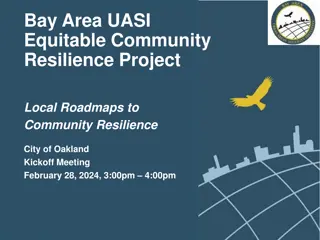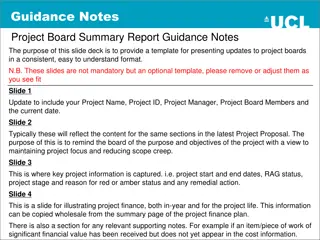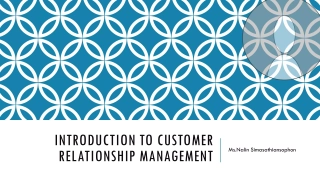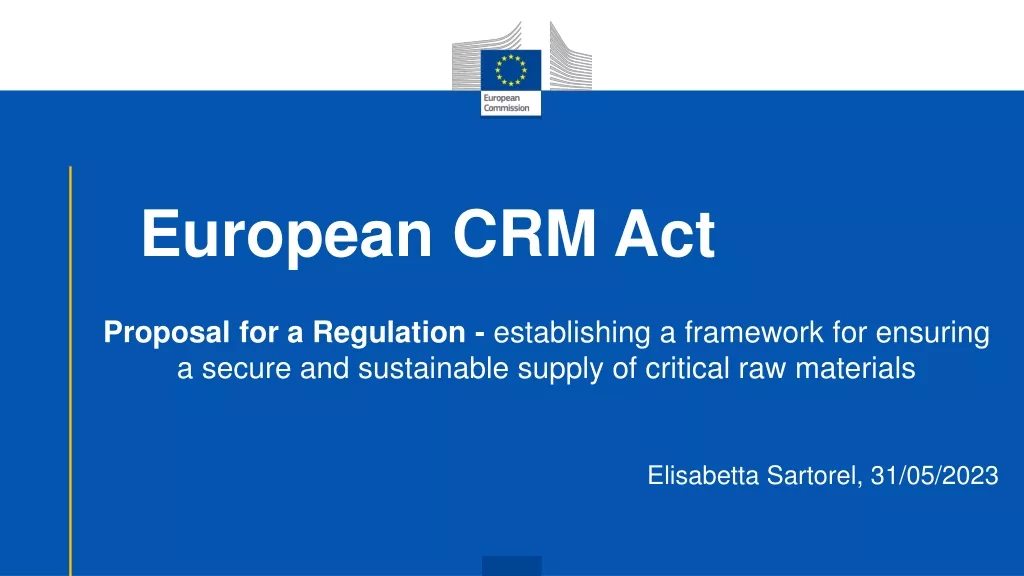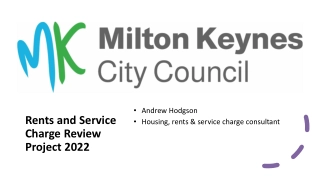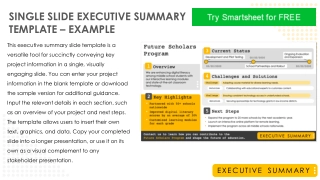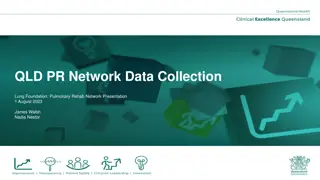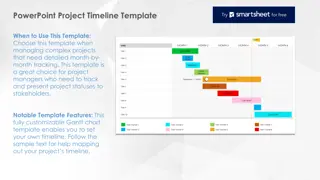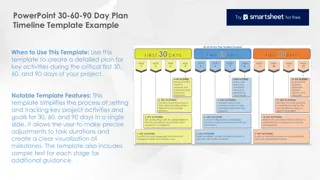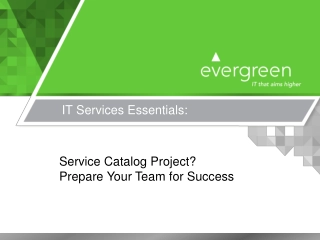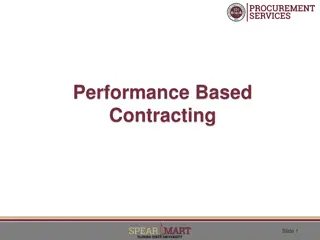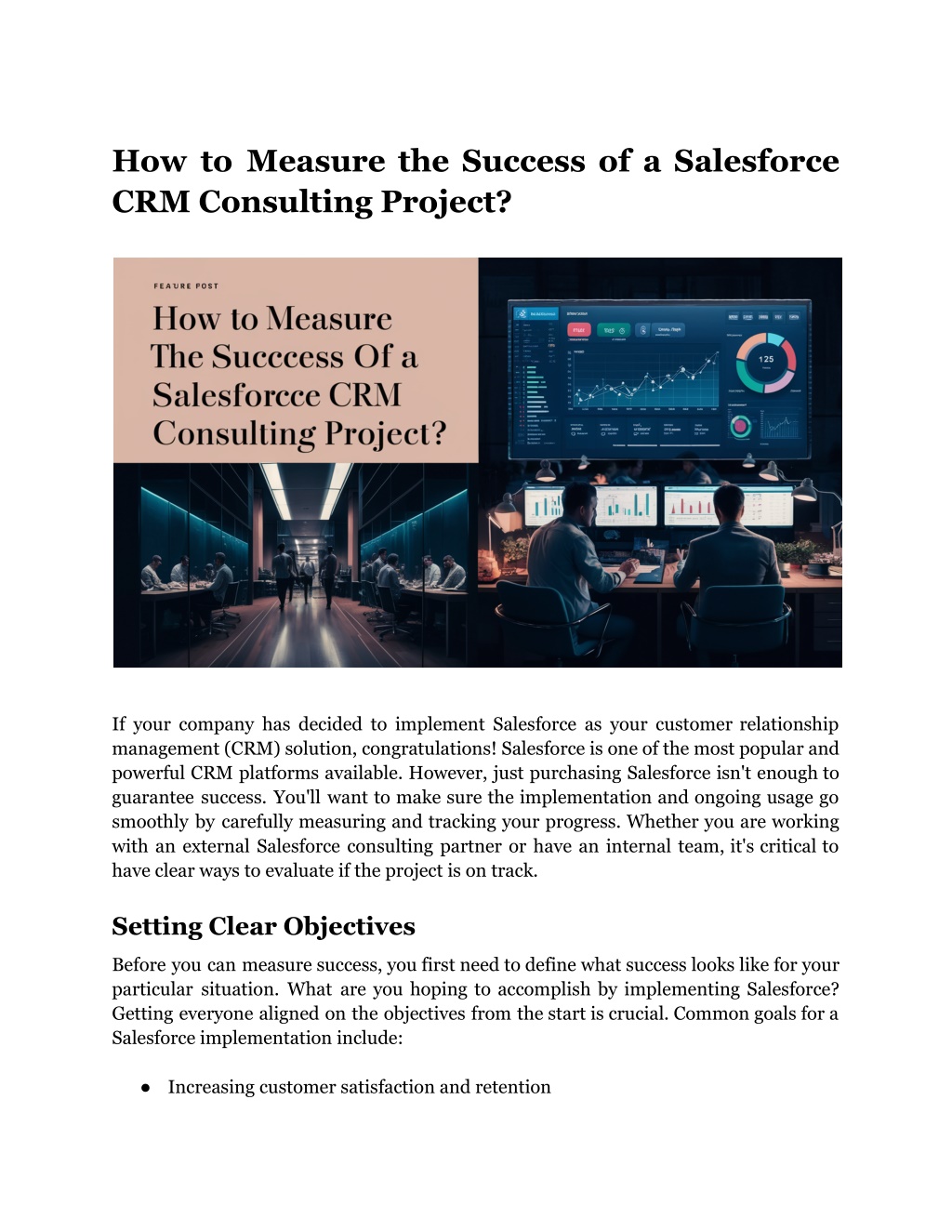
How to Measure the Success of a Salesforce CRM Consulting Project?
Uncertain if your Salesforce consulting project is working? Discover key metrics to measure user adoption, revenue growth, and overall ROI. Ensure your CRM delivers real results.
Download Presentation
Please find below an Image/Link to download the presentation.
The content on the website is provided AS IS for your information and personal use only. It may not be sold, licensed, or shared on other websites without obtaining consent from the author. Download presentation by click this link. If you encounter any issues during the download, it is possible that the publisher has removed the file from their server.
Presentation Transcript
How to Measure the Success of a Salesforce CRM Consulting Project? If your company has decided to implement Salesforce as your customer relationship management (CRM) solution, congratulations! Salesforce is one of the most popular and powerful CRM platforms available. However, just purchasing Salesforce isn't enough to guarantee success. You'll want to make sure the implementation and ongoing usage go smoothly by carefully measuring and tracking your progress. Whether you are working with an external Salesforce consulting partner or have an internal team, it's critical to have clear ways to evaluate if the project is on track. Setting Clear Objectives Before you can measure success, you first need to define what success looks like for your particular situation. What are you hoping to accomplish by implementing Salesforce? Getting everyone aligned on the objectives from the start is crucial. Common goals for a Salesforce implementation include: Increasing customer satisfaction and retention
Improving sales team productivity and effectiveness Gaining better visibility into the sales pipeline Streamlining marketing and sales alignment Enhancing data quality and reporting capabilities Your goals have to be time-bound, relevant, measurable, attainable, and specified (SMART). As an alternative to merely "increase sales," an aim would be to "increase new business revenue by 20% over the next 12 months after Salesforce launch." Your progress toward your primary goals may be monitored by selecting the right metrics after you've recorded them. Read More Articles: What Is The Best Season For Barossa Valley? User Adoption Metrics One of the most important factors in any successful CRM rollout is user adoption. If your employees don't fully utilize the new system, you won't see the maximum benefits. Some key user adoption metrics to measure include: Number of licenses provisioned vs. active users Frequency of individual user logins Usage of core features like opportunity management, case management, etc. Data quality levels in the system Salesforce training completed by team members Low adoption numbers are an immediate red flag that you may need more training, change management efforts, or other adjustments to drive higher engagement with Salesforce. Many Salesforce partner offer services to analyze user adoption trends and patterns within your specific Salesforce instance. They can pinpoint potential problem areas and recommend best practices to increase adoption over time. Sales Effectiveness Metrics Since improving sales performance is a common objective, you'll want to closely track metrics related to your sales team's effectiveness after going live on Salesforce, such as: Sales cycle lengths Conversion rates from lead to opportunity to closed/won Average deal size Sales rep attainment of quotas Number of customer meetings and interactions logged
Comparing these numbers to your historical baselines and targets can show whether Salesforce is truly improving sales productivity as intended. If the metrics aren't moving in the right direction, you may need to re-evaluate things like sales process definitions, data hygiene, integration points, or training gaps. Customer Service Metrics For companies utilizing Salesforce Service Cloud for case management and customer support tracking, there are some insightful metrics to review such as: Case resolution times Case reopen rates Call deflection rates Self-service usage levels Customer satisfaction scores Improving customer service and support is a powerful benefit of Salesforce CRM. Monitoring these metrics can confirm whether you are indeed becoming more responsive and effective in addressing customer needs on time. Marketing Metrics If your marketing team will be using Salesforce to run campaigns, track leads, integrate with marketing automation tools like Pardot, and more, look at metrics like: Number of marketing-qualified leads created Lead response times Cost per lead Campaign return on investment Customer lifetime value Better marketing practices enabled by Salesforce should lead to improvements in the quality and volume of leads being passed to sales. You can also expect a better ROI on campaigns and deeper intelligence into the overall customer lifecycle. Other Reporting & Dashboards In addition to those focused metric areas, Salesforce provides robust reporting and dashboard capabilities to create customized views into virtually any data model or process you need to analyze, such as:
Sales forecasting projections Sales team leaderboards Product/service mix analyses Bookings and billings reports Renewals and churn metrics Review the adoption of your custom reports and dashboards themselves. If those tools aren't being utilized, you may need to re-evaluate their usefulness or provide more training. Process Reviews & Feedback Metrics and KPIs are invaluable but don't overlook the importance of qualitative feedback as well when measuring success. Periodically solicit input from all user groups on what's working well, what's not, and any issues or desired improvements, such as: Streamlining any overly complex processes Enhancing specific features or functionalities Requesting new reports or dashboards Addressing training gaps Integrating with other cloud apps Combining this qualitative context with quantitative metrics data will give you a well-rounded perspective. This approach helps you see where you are succeeding and identify opportunities to keep optimizing your Salesforce experience. Gather feedback from your executive sponsors and stakeholders. Their assessment of whether the project is truly delivering on the expected business objectives and ROI is critical. Celebrating Successes While measurement is vital, don't forget to celebrate successes along the way too! Implementing a CRM transformation is a major undertaking, so make sure to recognize milestones like: Completing key project phases Reaching user adoption targets Delivering new business value Resolving major challenges
Expanding Salesforce into new teams or use cases These wins help build momentum, reinforce positive behaviors, and keep the team motivated through the inevitable ups and downs of any long-term technology initiative. Read More Articles: Who Provides Cyber Security? Sustaining Long-Term Success Measuring success isn't just for the initial go-live period. Your CRM system needs to be continuously fine-tuned and evolved as your business changes. Develop checkpoints and health checks on a quarterly or annual basis to examine: Adoption trends over time - Is usage still strong? Expanding requirements - What new needs have emerged? Releases and updates - Are you utilizing the latest Salesforce innovations? Training programs - Do you have an ongoing training strategy? New integrations - What other systems need to connect to Salesforce? Optimization areas - Where are further refinements needed? Having a structured process to perform regular assessments will prevent your Salesforce investment from getting misaligned with your business. Wrap Up Consistent measurement is essential for realizing the maximum benefits and driving continuous improvement with your Salesforce solution over time. At WhiteRock, we specialize in elevating your business through expert Salesforce CRM consulting. As a trusted Salesforce CRM consultant, we offer tailored solutions that drive efficiency. Take the first step towards the success! Site Article: How to Measure the Success of a Salesforce CRM Consulting Project?








